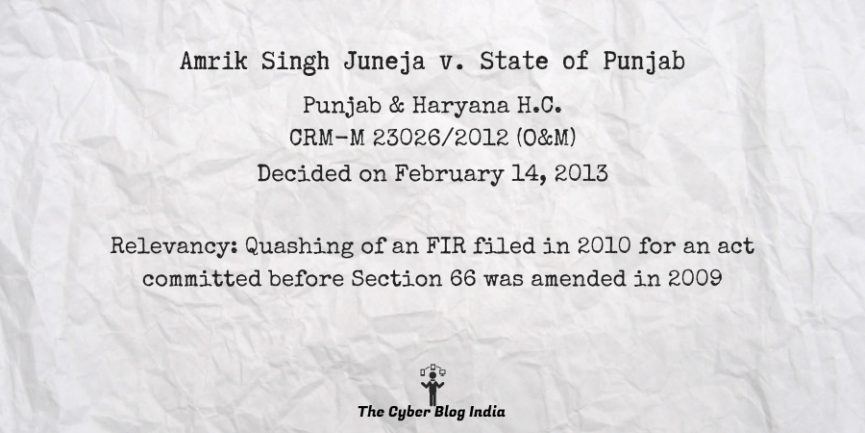Amrik Singh Juneja v. State of Punjab

Amrik Singh Juneja v. State of Punjab
In the Punjab & Haryana High Court
CRM-M 23026/2012 (O&M)
Before Justice Sabina
Decided on February 14, 2013
Relevancy of the case: Quashing of an FIR filed in 2010 for an act committed before Section 66 was amended in 2009
Statutes & Provisions Involved
- The Information Technology Act, 2000 (Section 43, 66)
Relevant Facts of the Case
- The letter in dispute had been, allegedly, written by the petitioner on 29.2.2008. The matter was reported to the Police on 14.3.2008, whereas, offence with regard to the hacking of a computer was inserted in the Act with effect from 27.10.2009.
- The act committed under Section 43 of the Act became punishable under Section 66 of the Act with effect from 27.10.2009 by virtue of Act 10 of 2009.
- Thus, at the time when the petitioner had, allegedly, issued the letter in question, no offence could be said to have been committed by the petitioner under the Act.
- FIR in question was registered on 10.6.2010.
- The petitioner is the father-in-law of respondent number 2. Respondent number 2 and daughter of petitioner number 3 have matrimonial litigation and the present FIR is the outcome of the said matrimonial dispute.
- The matter was duly investigated by the police and the Superintendent of Police after the inquiry had opined that the allegations levelled by respondent number 2 the application were not proved.
- The Senior Superintendent of Police had forwarded the said inquiry report, Annexure P2, vide Annexure P3 to the Inspector General of Police for further necessary action with the recommendation that no offence could be said to have been committed by the petitioner.
Opinion of the Bench
- In view of the amendment in Section 66 of the Act, if any person does any act referred to in Section 43 of the Act shall be punishable with imprisonment which may extend to three years or fine which may be extended to ₹ 5,00,000 or with both.
- In the present case, the act in question had allegedly been done by the petitioner on 29.2.2008.
- At that time, the amendment in Section 66 of the Act had not come into force and thus, at that time, petitioner was not liable for punishment under Section 66 of the Act. The complainant, if aggrieved, could have claimed damages under Section 43 of the Act.
- In these circumstances, the petitioner cannot be criminally prosecuted after the amendment had come into force as at the relevant time, no offence was allegedly committed by the petitioner. Hence, the continuation of criminal proceedings against the petitioner would be nothing but an abuse of process of law.
Final Decision
- Accordingly, the petition was allowed and subsequent proceedings are quashed.
This case summary has been prepared by Mansi Vats, an undergraduate student at UPES School of Law, Dehradun, during her internship with The Cyber Blog India in June/July 2020.
